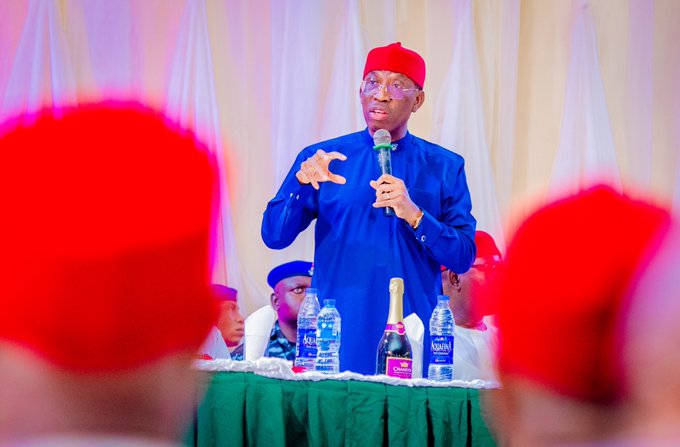Former Delta State Governor Ifeanyi Okowa has firmly denied any involvement in an alleged 13 percent oil derivation fund diversion, as he responds to recent media reports suggesting otherwise.
A statement released by Mr. Olisa Ifeajika, Okowa’s media aide, insists that the ex-governor’s appearance at the Economic and Financial Crimes Commission (EFCC) has no connection to these allegations.
“This accusation is as ludicrous as it is outlandish,” Mr. Ifeajika declared on Monday.
He described the allegation of a N1.3 trillion fund diversion as a “rehash of the same spurious claims” that surfaced while Okowa was still in office.
Ifeajika accused certain individuals of rehashing old accusations as part of a deliberate, well-orchestrated campaign to tarnish the former governor’s image.
He asserted that “haters” were using Okowa’s EFCC invitation as an opportunity to propagate false stories.
“These individuals and their hirelings are malicious, myopic, vindictive, and prejudiced,” Ifeajika added.
“They are bereft of commonsense,” he said, questioning how anyone could claim that N1.3 trillion was diverted without leaving the state’s workforce unpaid or halting public projects.
Okowa’s aide ridiculed the claims, saying, “It would mean that the government would have no funds to operate, pay salaries, or execute any projects.”
The statement contended that for Okowa to divert N1.3 trillion, he would need to have embezzled approximately N16 billion monthly for eight years.
“No right-minded person could believe such a ludicrous accusation,” Ifeajika argued.
He explained that the EFCC had only called Okowa in response to petitions filed by unnamed individuals.
According to Ifeajika, Okowa willingly went to the EFCC office in Port Harcourt upon his return from vacation, acting as a “man with a clear conscience.”
Okowa, he said, has “nothing to hide.”
The allegations Okowa faces involve accusations that he used state resources to buy an 80 percent stake in Premium Trust Bank.
Additionally, there are claims that he diverted funds to build estates in Asaba and Abuja, as well as hotels.
Okowa’s media aide dismissed these allegations as “wild conjectures and unverifiable claims” aimed at misleading the public.
He claimed that the media’s treatment of these accusations lacks “journalistic standards of factual reporting, fairness, and balance.”
Mr. Ifeajika criticized the sensationalism surrounding the reports, which he said were “riddled with outright lies.”
The statement further described these stories as “diabolical,” intended to “beguile and incite” the public against Okowa.
But according to Ifeajika, these attempts to discredit the former governor would ultimately fail.
“Like previous failed attempts to drag Dr. Okowa’s name in the mud, this renewed offensive against him is an exercise in futility,” Ifeajika stated.
He argued that no evidence has been presented to substantiate the claims against Okowa.
“The EFCC has not established any case against Dr. Okowa,” he emphasized.
Okowa’s aide stated that while the EFCC routinely investigates complaints, Okowa’s conscience remains clear.
Ifajika accused certain media outlets of acting as “puppets” for those aiming to destroy Okowa’s reputation.
He urged the public to dismiss the accusations as baseless and to ignore those spreading “misinformation.”

